

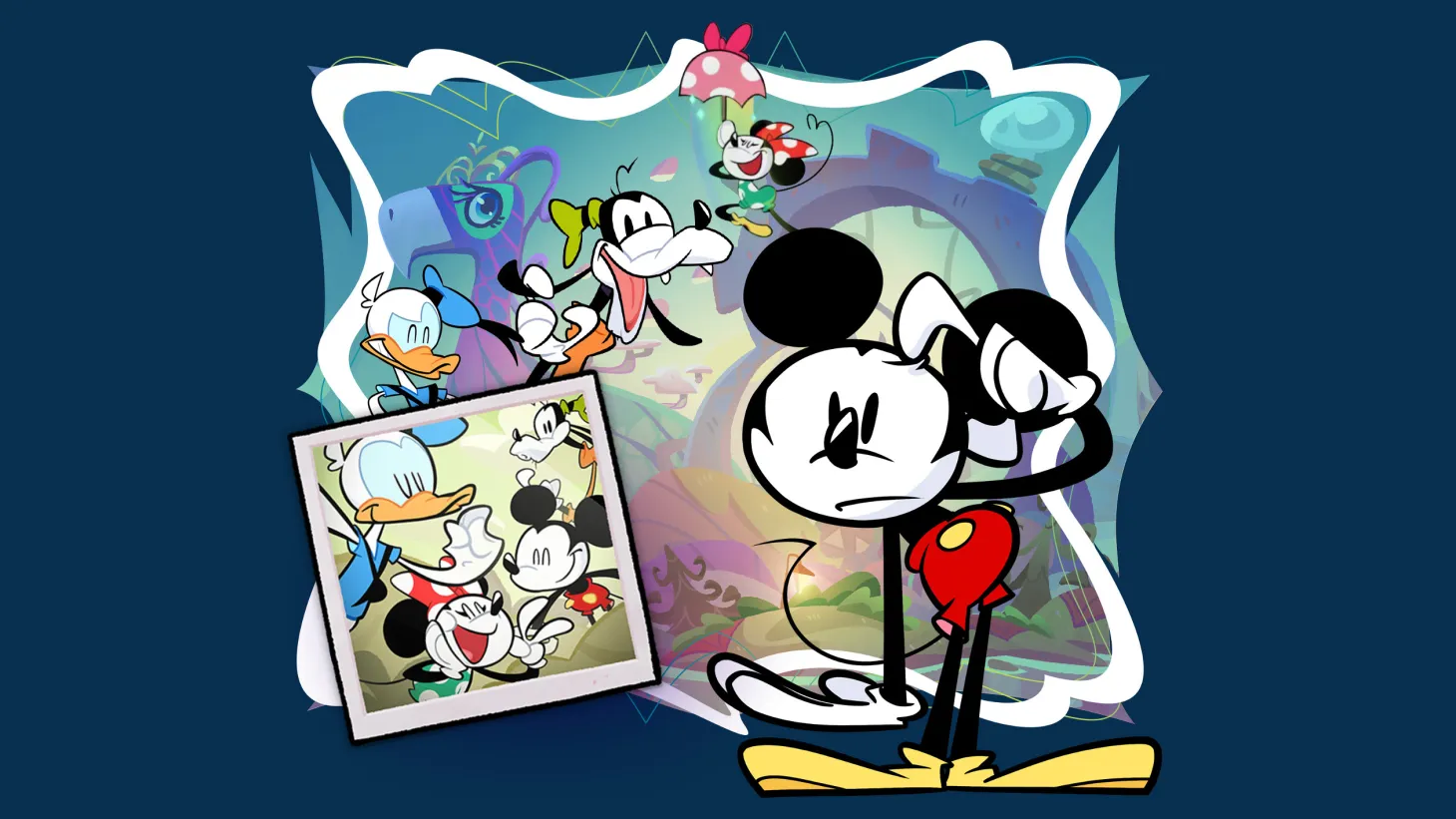
Years ago, Disney reshaped its approach to gaming. Recognizing the potential to connect its global audience to the world’s most financially successful entertainment industry, it hired former PlayStation portfolio boss John Drake to lead its games licensing division after years of exclusive Star Wars contracts with EA, movie tie-ins, and mobile releases.
Since then, we’ve received games like Star Wars Jedi: Survivor from Respawn Entertainment, Marvel's Midnight Suns from Firaxis Games, and more. And with additional games on the horizon, like Ubisoft’s Star Wars: Outlaws and Avatar: Frontiers of Pandora, the future of games based on Disney properties looks bright. But those games, like most using Disney intellectual properties, are produced through licensing arrangements. Disney Illusion Island stands separate from all those with one key distinction: it’s the first to be published by Walt Disney Games, meaning it could be the first dud or hit with Disney’s hand directly on it.

After playing Illusion Island for roughly four hours during an exclusive hands-on preview, including 30 minutes of 3-player co-op, I can confidently say that I think Disney has a hit on its hands. Unless something drastically changes after the game’s opening three hours, Disney, platformer, and Metroidvania fans are in for a treat, and their children are, too.
Illusion Island is beautiful, with an art style that sits confidently and uniquely between Mickey’s Toontown aesthetic and the recent excellent Mickey Mouse shorts that have been running for a decade. As a result, cutscenes in Illusion Island feel just like Mickey Mouse cartoons. In gameplay, Mickey, Minnie Mouse, Donald Duck, and Goofy feel alive. While each character moves at the same speed and performs the same moves, differences in animation make each feel distinctly their own. For example, Goofy lumbers as he platforms while Mickey moves like classic animation come to life. These characters being voiced by the official actors adds to the feeling of authenticity.
“I obviously love the new stuff, but it’s Mickey’s entire history,” Dlala Studios CEO and Illusion Island director AJ Grand-Scrutton tells me, explaining how Disney’s entire back catalog of Mickey content inspired the game’s visual style. “I am a massive fan of the ’30s and ’40s stuff where Mickey was quite cheeky [...] and quite naughty, doing stuff he might not necessarily do now.
“We got to hand-animate four of the most famous characters in history and it was a ton of fun. There are lots of silly animations in there, but really all that mattered to us was joy.”
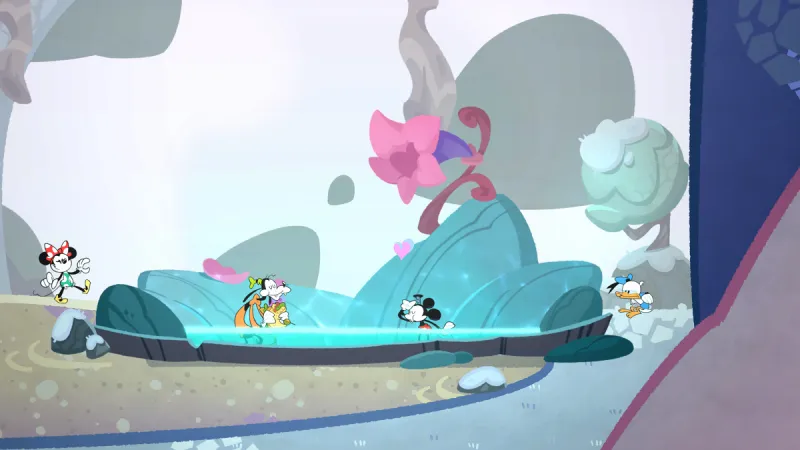
Dlala also created a new world for the broader Mickey canon in Illusion Island called Monoth, complete with many original characters. Grand-Scrutton shudders when I ask about adding to Disney’s iconic canon. He says no word terrifies him more than “canon,” but that the team tried creating a “wonderful story for Mickey Mouse and friends to go on,” and if it’s one referenced elsewhere by Disney, he’ll “probably cry for two weeks straight from happiness.”
Grand-Scrutton, lead designer Grant Allen, and the rest of the team I spoke to exude joy when talking about its game. Of course, Dlala’s been working on it since completing development on Xbox’s Battletoads revival in 2020, and it is the team’s commercial product, but I sense genuine love for Disney in every answer I get. And the team knows its stuff, studying not just Mickey Mouse shorts and movies, but the entire ethos surrounding the character, from history to the theme parks and more.
Memorabilia Bundles litter Illusion Island’s Metroidvania-esque map, which opens up as I acquire new abilities like an extended boost jump, wall jumping, and ground pound, which unlock pieces of Mickey Mouse history redone in Dlala’s style. I find Pete’s Underpants from 1990’s The Prince and the Pauper and more from 1937’s Lonesome Ghosts (Grand-Scrutton’s favorite Mickey Mouse short).
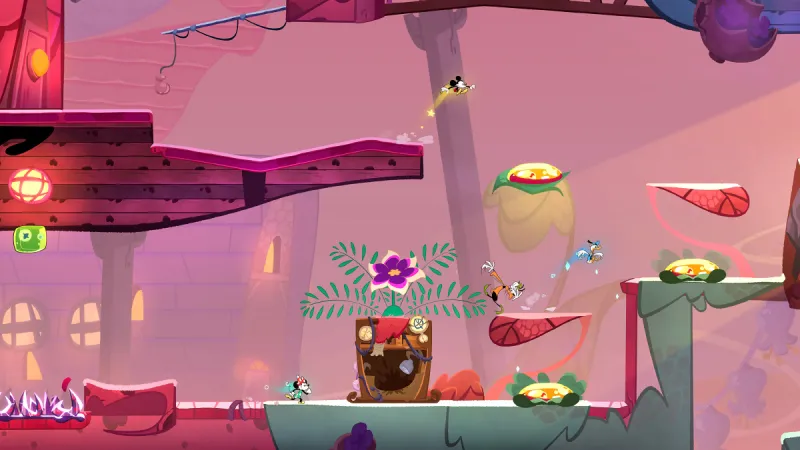
Beyond making its mark on Disney history with new renditions of classic characters and props, Dlala’s also memorialized various members of the 37-person studio with Tokun cards. These collectibles provide lore about original characters and creations and information about the team. One Dlala artist named Rachel is represented by Keh, who resides in Monoth’s Gizmopolis and draws everyone who enters. Grand-Scrutton gleefully explains the story behind each in-game character’s art and “lore” based on a different Dlala team member I encounter.
As I travel from Pavonia’s Terrarium Town, which feels like a more natural area of Monoth compared to the mechanical underbelly of Gizmopolis, I found Illusion Island’s platforming fun. If this is any indication, Illusion Island is more about the pleasure in exploration than the challenge. There are thousands of Glimt currency pieces to pick up while platforming through Monoth, and the more you collect, the more lore you unlock. There are dozens, if not hundreds, of collectibles like Memorabilia Bundles and Tokuns to find, too.
Illusion Island doesn’t appear to be a nail-biting experience. But I won’t say I didn’t die, or rather, get “stamped.” Because Mickey and friends can’t die, according to Disney rules, they get stamped and are instead turned into mail that respawns within various mailbox checkpoints.
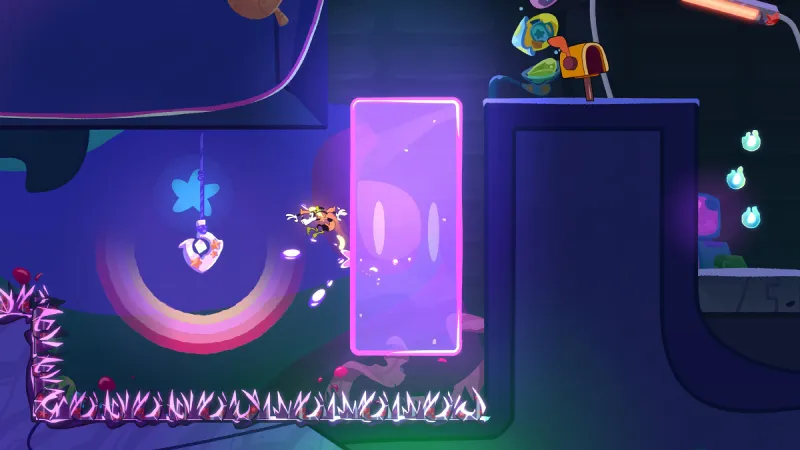
This isn’t surprising, considering a crucial part of the target audience is children. But there are built-in features to make the game more or less challenging. When you select a character, you choose how many hearts they have. You can select one, two, or three, but you can also set unlimited hearts. In multiplayer, characters can hug each other to gain a heart, jump off each other leapfrog-style for easier gap clears, and drop ropes to players below, letting them skip platforming elements altogether, something fans of 1992’s World of Illusion might find familiar.
Dlala has included several quality-of-life features in Illusion Island’s “Mickeyvania” style map. A small creature that the team dubs a hidizard appears to indicate a hidden area has already been explored. When I encounter a pathway I can’t quite explore yet, a question mark appears on the map at that location. When I later obtain the ability I need, I see a new marker there that resembles the ability I now have that’s needed to advance.

With no traditional combat, Allen tells me Illusion Island is about mastering movement and that Dlala tried to stick the balance between fun and progression of abilities. After playing it myself, that translates to finding joy in the capabilities of Illusion Island’s mechanics. It’s not about running up a hill of countless enemies designed to take you out at the slightest misstep. Most of the enemies I encounter don’t feel like enemies but simply Monoth’s inhabitants that happen to move and react hazardously.
That is until I reach the game’s first boss: a thief who holds one of the three tomes Mickey and friends have been tasked with retrieving for the good of Monoth. She sits in the center of the screen with a shield. Instead of attacking her directly, I platform over falling blades and other hazards to get a little higher on the large arena-like stage. There are yellow buttons I jump on to lower her shield. Once the shield’s down, a hazard falling from above damages her, and after doing this a couple of times, with escalating dangers for me to platform around, the fight is over. I like how this boss fight provides the rush of combat without directly using combat, and I look forward to seeing how Dlala works around that void in other instances.
“I hate boss fights in games,” Grand-Scrutton says. “It’s easier to name your worst boss fight than your favorite, right? So for our creative vision [...], we go through the goals of what we’re trying to achieve with this feature [boss fight]. This is the feeling we want the player to feel, and we steal a lot of that from the Imagineering approach because we all just really want to be like Imagineers.
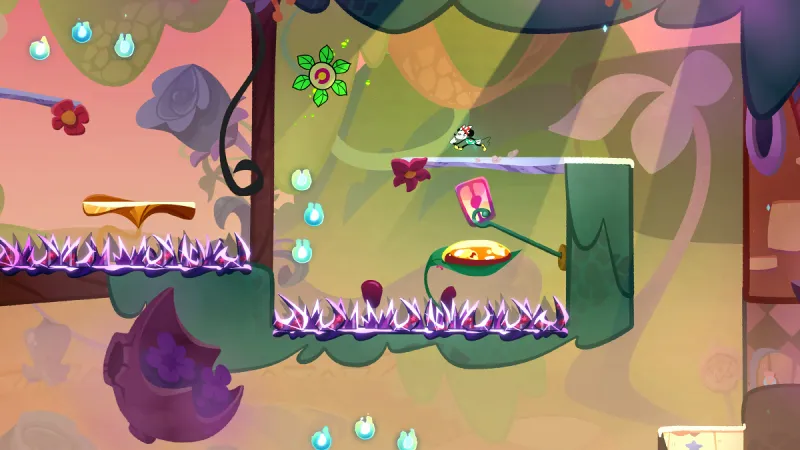
“I think what we had for [this boss fight] was that it needs to feel like an embodiment of a mini-level. It was about viewing bosses as a single screen level rather than viewing the boss as an enemy you have to defeat. And it became much more about combining abilities and movement into something like a puzzle. We didn’t miss combat. It just felt right, and it fits with the rest of the game.”
This boss and the rest of what I play in Illusion Island come wrapped in a score from composer David Housden, who also composed the score for Dlala’s Battletoads, and I couldn’t be more impressed with what I heard. It’s immediately memorable and whistle-worthy and is right at home in Disney’s catalog of excellent music. It reminds me most of walking through Disney World’s Magic Kingdom, which starts with magical whimsy on Main Street before diving into other genres as you cross into the parks’ different lands. Considering Illusion Island’s Monoth is split into various lands and biomes, it’s easy to see how Disney’s isolated approach to theme park lands inspires both Dlala’s design and Housden’s score.
This team clearly has the Disney chops; it knows the company’s extensive and memorable history and fuses that with fluid and fun platforming, a vibrant and expansive world, and a new but lovingly crafted take on some of the most popular mascots in the world. So far, it’s working on every level for me, but these types of games are all about the escalation in exploration, and I won’t be able to judge that until Illusion Island hits Switch in July. That said, consider me happy to wait in the queue that is the time between now and release. I only hope the full ride waiting for me on the other side is worth the wait.
This article originally appeared in Issue 357 of Game Informer.